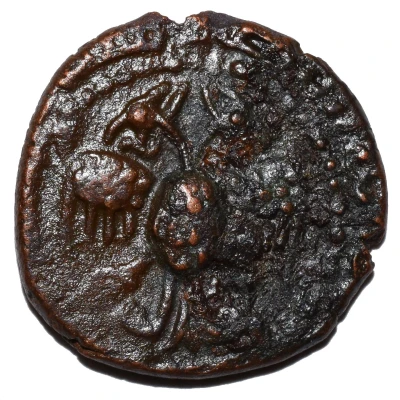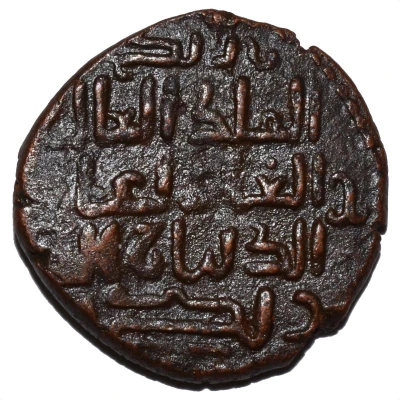


© Fred Cherrygarden
Dirham - 'Imad al-Din Zangi II ND
| Copper | 6.01 g | 22 mm |
| Issuer | Emirate of Sinjar (Zengid dynasty) |
|---|---|
| Emir | Imad al-Din Zengi II (1171-1197) |
| Type | Standard circulation coin |
| Years | 1171-1197 |
| Value | 1 Dirham |
| Currency | Dinar (1171-1220) |
| Composition | Copper |
| Weight | 6.01 g |
| Diameter | 22 mm |
| Thickness | 1.7 mm |
| Shape | Round (irregular) |
| Technique | Hammered |
| Orientation | Coin alignment ↑↓ |
| Demonetized | Yes |
| Updated | 2024-10-05 |
| Numista | N#239820 |
|---|---|
| Rarity index | 91% |
Reverse
Legend in six lines, citing name titles and ancestors of Imad al-Din Zengi II. Zengid tamgha left and right of the legend.
Script: Arabic
Lettering:
بن زنكي
الملك الفاهر
العادل عماد
الدنبا و الدين
زنكي ابن
مودود
Translation:
Ibn Zengid
The brilliant and just king, Imad al-Dinba and son of the Zengids, son of Mawdud
Zangi son
friendly
Edge
Plain.
Comment
Abul Fatah Imad ad-Din al-Malik al-Adil Zengi Ibn Moudud (or bin Mawdud) (unknown-1197 AD), also referred as Imad al-Din Zangi II. Not to be confused with the founder of the dynasty Imad al-Din Zengi (1127–1146 AD) who was his grandfather.More pictures of the same coin, from Zeno.ru
Weights vary between 7,8 to 3.8 grams, but most of the samples are in the 5-6 grams. Diameters vary between 19 to 24 mm.
Mint: Sinjar (سنجار)
Zengid tamgha on both sides left and right of the legend on the reverse.
However, since most samples are off center, or struck in flans smaller that the die, generally only one tamgha can be seen. Only in rare examples both tamghas can be seen as in the next picture (credit zeno.ru):
For the same reason above, mint and date are seldom clearly readable.
According to catalog BMC Catalogue of Oriental Coins in the British Museum - Volume 3. The Coins of the Turkman Houses of Seljook, Urtuk, Zengee, etc, in the British Museum, Classes X-XIV there is a variant #619 where there is an inscription on the eagle's breast:
Interesting fact
One interesting fact about this coin is that it was issued during the reign of 'Imad al-Din Zangi II, who was a prominent leader of the Zengid dynasty, which was a powerful Turkish dynasty that ruled much of the Middle East and Central Asia during the 12th and 13th centuries. The Zengid dynasty was known for its military campaigns and its support of art, literature, and architecture, and this coin reflects the cultural and economic achievements of that era.